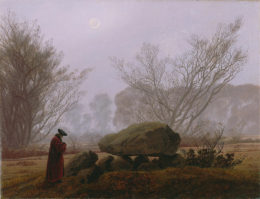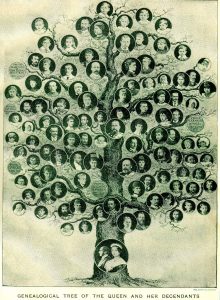July Fourth always inspires a nostalgic feeling in me. When I was a kid, the holiday roughly marked the halfway point of summer break. Then, and now, it also means the beginning of the dog days of summer. The term “dog days” originated with the ancient Greeks, who coined it to describe the longest days of the year, which brought with them the most oppressive sunlight. (more…)
Tag: time
-
My grandmother used to walk me to school when I was in kindergarten. This was before mass shootings across the country provoked enhanced school security measures, and us kids would simply line up in front of the building before being let inside. One kid in particularly was always first. He was a blond boy whom we’ll call Johnny. He always took such pride in being first, scurrying into the classroom before everyone else. (more…)
-
1,446 words
More than one person I’ve spoken to, both offline and online, has commented on how the passage of time seems to have changed very little in the past two years. (more…)
-
March 24, 2021 Kathryn S.
“He Doesn’t Worry Too Much If Mediocre People Get Killed in Wars and Such” Tito Perdue’s The Smut Book & Cynosura
4,430 words
He had me at: “It was still the South, he knew it for a certainty when they passed an aged negro in overalls hobbling down along the highway toward no conceivable destination. The land was cursed. God, he loved it.” [1] Tito Perdue, author of the two novels here reviewed, The Smut Book and Cynosura, is a proud Southerner who has enjoyed skewering the sacred cows of these, our cursed times since he became a writer in the early 1980s. (more…)
-
Anthony Burgess
1985
London: Hutchinson, 1978Anthony Burgess of A Clockwork Orange fame celebrated thirty years of Nineteen Eighty-Four with his 1985. It is in two parts: a discussion of Orwell and freedom, and a novella updating Winston Smith’s struggle. (more…)
-
6,629 words
This is an old and very cruel god . . .
We will endure;
We will try not to wince . . .
If indeed it is for your sakes,
If we perish or moan in torture,
Or stagger under sordid burdens
That you may live —
Then we can endure . . .
Without utter bitterness.
But, O thou old and very cruel god,
Take, if thou canst, this bitter cup from us. [1] (more…) -
 6,101 words
6,101 words 6,101 words
6,101 wordsCome out, ’tis now September, the hunters’ moon’s begun,
And through the wheaten stubble we hear the frequent gun;
The leaves are turning yellow, and fading into red,
While the ripe and bearded barley is hanging down its head.— “All Among the Barley,” British folk song (more…)
-

Caspar David Friedrich, Wall at Dusk, 1837-40.

Caspar David Friedrich, Wall at Dusk, 1837-40.
3,000 words
My ancestors arrived in the Tidewater region of this continent around 400 years ago, and lived and died almost entirely beneath the Mason-Dixon line. As a Catholic, a Southron, and an Anglo-American, I am filled with sorrow and impotent rage at the sight of my forebears being demonized by those who are so manifestly inferior to them. (more…)
-

Eli Lotar, Hôpital des Quinze-Vingts, 1928.

Eli Lotar, Hôpital des Quinze-Vingts, 1928.
1,129 words
Editor’s Note: The following is a subchapter from Wilmot Robertson’s book, The Ethnostate. It may provide some encouragement in these trying times. For more on Robertson, see Spencer J. Quinn’s review of The Ethnostate and all posts tagged Wilmot Robertson.
Pessimism is a vital ingredient of tragedy, which is the highest form of drama and the dominant theme in great literature, art, and music. No optimist could possibly have created characters like Oedipus, Lear, and Faust. Still, optimism is a major force for great deeds in the real world. Few will struggle to perform heroic feats unless they feel that “the world,” (more…)
-
4,547 words
Part 2 of 4 (Part 1 here; Part 3 here; Part 4 here)
4. Tradition
Having now discussed the clannic being of the individual purely in philosophical terms, I now turn to a consideration of the treatment of this idea in the Germanic tradition.
The first thing we must note is what can be called the “primacy of the past” in that tradition. (more…)
-
Part 1 of 4 (Part 2 here; Part 3 here; Part 4 here)
1. Introduction
This essay presents an “ontology of the individual.” The theory is new, though it has very old roots. “Ontology” is the branch of philosophy that studies being-as-such, or “being as being,” as Aristotle expressed it.[1] My argument is that the being of an individual person is bound up with that individual’s relation to his family or clan. (more…)
-
2,673 words
T. S. Eliot’s Four Quartets can be considered amongst the greatest English poetry of the 20th century, and arguably amongst the greatest English poetry ever. The four poems meditate repetitively and brilliantly on man’s relationship to time and eternity, and posit a religious solution to the problem of man’s need for meaning in the face of death. (more…)
-
August 7, 2013 Savitri Devi
History, Action, & the Timeless
9,576 words
Translated by R. G. Fowler
“Time, Space and Number
Fell from the black firmament,
Into the still and sombre sea.
Shroud of silence and shade,
The night erases absolutely
Time, Space and Number.”
—Leconte de Lisle (“Villanelle” [pastoral poem], Poèmes Tragiques)









